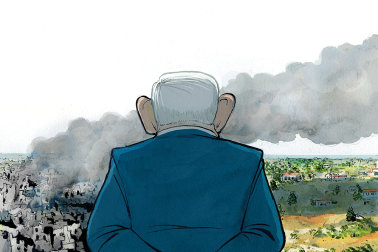No disrespect to any of the present incumbents, but Karl Miller (1931–2014) was a literary editor in an age when such jobs mattered. Between the late 1950s and the early 1970s he not only ran the books pages of two weekly magazines — The Spectator, and the Paul Johnson-era New Statesman — before moving on to edit the Listener, but did so with a conviction that their cultural stance was quite as important as the political material that crowded out the front end. The virus that had propelled him into literary journalism burned away for nearly 60 years, and his last book review appeared in these pages four days before his death.
Not everyone liked or approved of Miller, or thought that the considerable power he wielded either in Grub Street or in his subsequent incarnations as Lord Northcliffe Professor at UCL and founding editor of the London Review of Books was a good thing. The Bloomsbury diarist Frances Partridge left a caustic account of ‘an intelligent, auto-intoxicated Scot; doesn’t want to hear anything from anyone else, but just to do his own turn ad lib’; while even his son Sam, in this notably loyal and affectionate memoir, diagnoses an odd sense of entitlement, a hint that the 1950s Cambridge generation, of which his father was a part, ‘sometimes behaved as if the world had been created with their future success in mind’.
There is not very much in Fathers about Miller the books page trusty, although Sam does offer tantalising glimpses of teen-era notebooks in which the apprentice critic doles out marks out of a hundred to the great works of English literature (Hamlet comes out top with 95; The Turn of the Screw, alas, trails at 65). What we do get, on the other hand, are some sharp glances at Miller’s difficult early life — he was brought up by his grandparents — in working-class Edinburgh before the winds of upward social mobility that picked up so many talented grammar-school boys of the postwar era safely deposited him at Downing College, Cambridge, under the vigilant eye of F.R. Leavis.
‘You have been most unfortunate in the family you were born into,’ Karl’s duty-evading father once informed him — ‘That includes myself, of course.’ If Sam has his own family problems, then the ‘secret’ that hangs over his upbringing is pretty much a red herring. From the moment that Karl’s great Cambridge friend Tony White appears in the text, is introduced to Karl’s wife Jane and starts going on holiday with them, it is clear that Tony will eventually be revealed as Sam’s father. Sam himself was told shortly after Tony’s premature death in 1976. Karl, having been assured that the teenage boy ‘knew’, kept his lip buttoned for the next three and a half decades.
Given the story’s grounding in that late Fifties sexual sub-world of secret assignations, fake wedding rings and false names offered up to hotel receptionists, what follows might easily have opened up a gloomy landscape of inference, evasion and concealment. That it doesn’t is a testimony to the matter-of-factness — occasional rueful moments notwithstanding — with which all those involved seemed to have treated the situation. Sam has warm feelings towards both parent and surrogate, and the only real twitch on the thread comes when, discovering an entry in Tony’s diary that reads ‘a long-drawn out affair with Jane ended when she found out she was pregnant, possibly by me’, he adds the codicil: ‘I think I would have been pleased if there was more than that.’
Forty years gone, ex-actor, Connemara lobster-farm tenant and occasional author Tony, who turns out to have written a book called How to Run a Pub: Advice to Would-Be Publicans, is impossible to reconstitute. Adoring friends can only supply bromides: that he was blessed, that he was the life and soul of the party. Karl, on the other hand, cruises valiantly on into his eighties, pawky humour disguising, or sometimes failing to disguise, a fair amount of internal disquiet.
Tactfully composed and sensitively written, Fathers leaves an abiding impression of decent people doing their best in difficult circumstances. Meanwhile, a full-length biography of Karl is an absolute must.






Comments